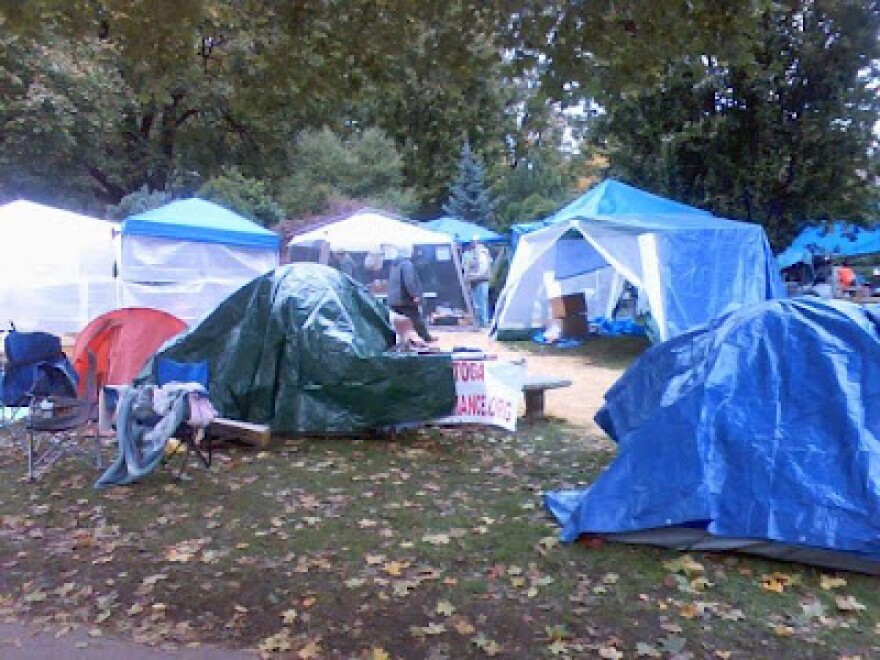Ten years ago the Occupy Wall Street movement quickly spread to other cities, including Albany.
2011's Occupy Wall Street Movement started in September when protestors gathered in Zucotti Park rallying against economic inequality. By October Occupy had established itself in Albany, across the street from City Hall and next to the state capitol.
The movement put a spotlight on income inequality, which has become a perennial political focus. The local anti-establishment crusade against the power of elites — the so-called 1% — was known as Occupy Albany.
The group's encampment was one of 2,000 across the globe. It sprung up in Lafayette Park across from the state capitol. More than a hundred protestors, ranging from high school students to senior citizens, demonstrated in a show of solidarity.
Among prominent local voices of the national movement, Bradley Russell was arrested in November 2011 after proclaiming he would exercise his First Amendment rights by occupying a spot on a strip of land in Lafayette Park, which adjoins Academy Park. Today, Russell believes Occupy was a catalyst for social change.
"The same people who were in that occupy camp downtown, and in the movement, kind of nationwide, have gone on, they've used those skills, they've continued to, you know, be active, they've continued to participate in any variety of important social movements since then. And there, you know, I think that they, collectively, the movement, brought the whole notion of economic inequality to the forefront of our politics. I think it set the stage for two campaigns from Bernie Sanders. You know, I feel like it was a training ground for a lot of people. A lot of people gained organizing experience, they've gone on to use it, " says Russell, whoa dds his fight for freedom of speech was bolstered when Albany County District Attorney David Soares refused to prosecute more than 100 Occupy-related cases, including one involving Colin Donnaruma...
"2011. At the time, if I'm not mistaken. You had Governor Cuomo, you had Dean Skelos running the Senate, and Sheldon Silver running the Assembly. And since that time, all three have either been convicted of felonies or corruption, or resigned office. And I'm not saying there's a direct correlation there. But I do think it's interesting looking back 10 years later. I think we had some concrete policy impacts and it's certainly a somewhat different environment than we were looking at 10 years ago," Donnaruma said.
Some say Occupy changed the psychology of people both in the Capital Region and nationwide about what to expect from government.
Donnaruma said "Yeah, the really interesting thing with Occupy is I don't think anyone really saw it coming, the way it took off. I think the message, like we are the 99% of economic justice and participatory democracy, really resonated in a way that it just spread like wildfire. And I do think that that type of movement certainly could occur again, I think that you know, the macro conditions haven't fundamentally changed. I think there's still a need for that type of organizing and mobilizing so I think it certainly could happen again, I think it probably needs to happen again.”
On December 22nd, 2011, as the cold and snow closed in, Occupy Albany ignored an order from the city to vacate the park... then, on Christmas Eve, police moved in to end the occupation, arriving in the afternoon on the day of the deadline, as they had promised. In some other cities, lawmen came without warning, in dead of night. By early evening, all the Occupy Albany tents were gone, save one taken intact by the protesters, who paraded it through the city. [Video] That led to a protracted legal standoff; eventually, charges against the protesters were not pursued by the district attorney.
Again, Russell:
"I think a lot of people feared that, that we would be dispersed and kind of scattered to the winds and that wouldn't, you know, amount to anything. And that's just simply not what happened. I think what happened is, it was like blowing a dandelion, instead of having, you know, all those seeds in one place, it dispersed all these activists to various locations, they have used those skills very constructively since then. So while it seems like quite a beating that we took, and literally, physically and, you know, figuratively, I think the long term results of that, you know, speak for themselves,” said Russell.
Occupy Albany to this day maintains a presence on Facebook.









